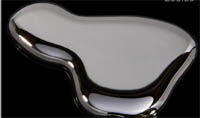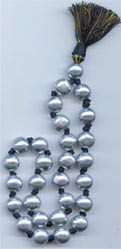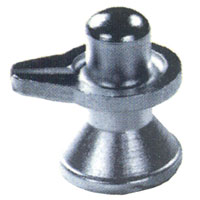|
|||||||||
|
|||||||||
|
|
|
|
|
|
|
|
|
|
|
|
|
|
|
|
|
Religious Items/Ritual Uses of Mercury
Jump To:
Azogue | Parad | General References
Azogue
Description: Metallic mercury (i.e., elemental mercury) may sometimes be used in ethnic folk medicine and for religious practices. It is most commonly sold under the name "azogue" (Hispanic), but may also be labeled as "vidajan" (Haitian/Creole) or "quicksilver" (English) in ethnic stores or botanicas specializing in spiritual and religious items. Persons practicing religions, such as Esperitismo, Santeria, and Voodoo, may carry the mercury in pouches, wear it as a charm or necklace, swallow it in drinks or as capsules, sprinkle it around a child's bed or inside a car for protection, or burn it in devotional candles. There may be other religions and cultures that use mercury or mercury-containing products in spiritual practices.
 |
| Click image for a larger view Source: NEWMOA, (elemental mercury - also known as azogue, vidajan, quicksilver, or metallic mercury) |
Potential Hazards: Even low levels of mercury exposure may cause negative health effects. Persons that use metallic mercury in spiritual and religious practices or sell it in stores, are often exposed to high levels of mercury vapor over a long period of time and may suffer serious health effects. If a mercury spill occurs, persons should immediately contact their state environmental agency for instructions on proper clean-up and disposal. They should contact their public health department or poison control center if they have been exposed to mercury vapors.
Recycling/Disposal: Elemental mercury is considered by the U.S. Environmental Protection Agency (EPA) to be a hazardous waste because of its toxicity. Therefore, it is recommended that elemental mercury and items that contain liquid elemental mercury be properly disposed of at household hazardous waste collection events and sent to a mercury recycler for reclamation.
 |
| Click image for a larger view Source: Massachusetts Executive Office of Environmental Affairs, (view of a botanica - candles, figurines) |
Statutes and Other Information: It is not illegal to use elemental mercury; however many states, including Connecticut, Maine, New Hampshire, New York, Rhode Island, and Vermont, restrict the sale and distribution of elemental mercury. Labeling of hazardous household products, including elemental mercury, is required under the Federal Hazardous Substance Act (FHSA), which is mandated by the Consumer Product Safety Commission (CPSC). However, much of the sale and distribution of elemental mercury for religious and ritualistic purposes operates underground. In some instances, persons have even been to known to sell azogue out of their homes.
There are many examples of community campaigns, organized by local departments of public health and environmental protection, which provide outreach and education to those who participate in the cultural and spiritual use of metallic mercury.
Links to these specific outreach and education programs and other useful information can be found in the "General References" section at the bottom of the page.
Parad
 |
| Source: http://www.futurepointindia.com, (parad mala) |
Purpose: The worship of parad in Indian culture is said to destroy one's sins - Hindus believe that by touching a Parad Shivling, one's sins are removed. The solid parad balls (i.e., mercury balls) are threaded and worn around the neck in the form of a necklace to protect one from evil spirits. Wearing these parad beads (e.g., parad mala, parad goli) is also believed to be useful in controlling various diseases, such as high blood pressure, diabetes, and asthma, and to increase sexual power. Solid mercury-based Indian idols are used in homes and in temples to keep away the evil eye.
 |
| Source: http://www.liveindia.com, (parad shivling) |
Recycling/Disposal: Mercury-containing items, such as parad figurines (i.e., Indian idols, Parad Shivling) and jewelry (i.e., parad beads), are considered universal waste. These products should be disposed of at household hazardous waste facilities and sent to a mercury recycler for reclamation.
Statutes and Other Information: These items are generally imported to the U.S. from India and are legal to have in the U.S. However, many states restrict the sale and distribution of these kinds of mercury-added products.
The state members of the Interstate Mercury Education and Reduction Clearinghouse (IMERC) define a novelty item as a "mercury-added product intended mainly for personal or household enjoyment or adornment, including items intended for use as practical jokes, figurines, adornments, toys, games, cards, ornaments, yard statues and figures, candles, jewelry, holiday decorations, and footwear and other items of apparel." Therefore, figurines and jewelry made of parad fall under the category of a mercury-added novelty product, and are subject to sales restrictions and prohibitions in many states, including California, Connecticut, Illinois, Indiana, Louisiana, Massachusetts, Minnesota, New Hampshire, New York, Oregon, Rhode Island, Vermont, and Washington.
Related Links:
http://www.liveindia.com/parad/
General References
The links below are general references that provide information about the use of mercury in ritual or spiritual practices and types of mercury-added religious products:
General Information about the Use of Mercury for Religious Purposes:
http://www.epa.gov/superfund/community/pdfs/mercury.pdf
http://www.naccho.org/topics/environmental/mercury/upload/MercuryFactsheet.pdf
http://www.altmedrev.com/publications/16/4/314.pdf
Mercury Health Effects and Potential Hazards:
http://www.ct.gov/dph/lib/dph/environmental_health/eoha/pdf/azogueenglish.pdf
Mercury Disposal Regulations:
http://www.epa.gov/epawaste/hazard/tsd/mercury/regs.htm
Outreach and Education Campaigns Targeted at Mercury Used for Religious Purposes:
http://www.newmoa.org/prevention/mercury/projects/legacy/JSI_MercuryAssessmentReport.pdf
http://www.ct.gov/dph/cwp/view.asp?a=3140&q=387466#Azogue
Mercury Product Phase-outs, Sales Prohibitions, and Exemptions:
http://www.newmoa.org/prevention/mercury/imerc/banphaseout.cfm
Spill Clean-up Guidance:
http://www.mass.gov/eea/agencies/massdep/toxics/sources/cleaning-up-elemental-mercury-spills.html
Last Modified 08/25/2020
Home
|
Pollution Prevention
|
Mercury
|
IMERC
|
Solid Waste
Hazardous Waste
|
Waste Site Cleanup
|
About NEWMOA
|
NEWMOA Members
Copyright 2025 NEWMOA, Northeast Waste Management Officials' Association
89 South Street, Suite 600; Boston, MA 02111-2651;
ph (617) 367-8558
fax (617) 367-0449
TDD/TTY (857) 265-3934
All Rights Reserved
Comments contact:
.
